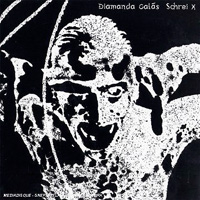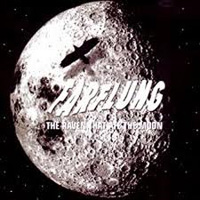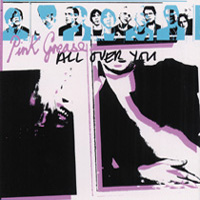 Diamanda Galás
Diamanda Galás
Schrei X (Mute)
An interview with Diamanda Galás
by Nik Rainey
Before we start, I have to say that it’s a real honor to be speaking with you today. I’m a longtime fan.
Well, thank you! You guys write some nice things in that magazine. I’ve noticed that.
(Aghast) You’ve read us?
Oh, yes. I have Internet access so I’ll see things under my name that say Lollipop and I like what you have to say about me. I’ve also noticed that you’ve written some really appropriate things about stuff I think is bullshit, so I appreciate that too. I love that (laughs).
 Well, pshaw. Explain, if you would, the title of your new album.
Well, pshaw. Explain, if you would, the title of your new album.
“Schrei” is the German word for “shriek.” Not shriek in the way that most Americans think of it, as it seems to have a much more pedestrian connotation over here. It means shriek in the sense of something that is very, very deeply located, a sort of non-verbal evocation of the soul. I call it “intravenal sound” or “intravenal song” when I discuss my work, a kind of song of the blood. I had always wanted to do this piece because I felt it would be the most direct signature of what intravenal song is for me. So we did Schrei 27 very quickly, in three days, but it took a lot more time to edit it. The performance version actually took a lot longer because it was slightly different and included different texts. Also, performing the thing live was a difficult thing. In the studio, you can take a break and come back to it and do a number of different things to come up with 27 minutes of the most high-intensity vocal work you’d ever want to do or hear. And suddenly you’ve got this fucking monster that you have to perform live with very few breaks. That’s why I have the live piece first and the radio performance second on the album, because they are quite different, though to the superficial ear they’ll probably sound the same. If you read any English newspapers (laughing), you know what I mean. “Oooh, that bloody woman’s screaming for an hour!” They’re good at that. And then there was this noise magazine which said, and I thought this was touching, that this was the most unlistenable album of the entire 20th century! And this is a noise magazine! You’re all a bunch of creampuffs! It’s so funny ’cause when they get these little machines going or they have their little, like, what Daniel Miller and I call “Industrial Asleep,” it’s this predictable kind of noise stuff, kinda loud but you know what it is. But when you do that with a voice, suddenly people are very upset and annoyed by it. There’re only a few people who’ve been able to approach this with a little bit of humor. There was one guy who said he was afraid to play it at the correct volume ’cause if a SWAT team broke in, they’d think he was strangling a woman or something, and I loved him for that! Shit, at least the guy’s honest.
 The sleeve says that it was “Performed in total darkness.” Do you mean that literally?
The sleeve says that it was “Performed in total darkness.” Do you mean that literally?
Yes. First of all, that’s the way I wanted it to be musically, just about the sound – it was done in quadraphonic sound with a lot of signal processing, but I also really wanted invisibility. Everything would come through the voice and I didn’t need more exposure than that. And then I had another thought about it which was I didn’t want anybody to get away from it with any visual aids, to look at me or each other or get distracted by something in the light – no, no, no, you sit yourself down and deal with this. This is not like visual art where you can look at something and walk away and come back and look at it again. You have to sit right there and deal with this shit for 45 minutes or something. That is hard work.
That’s precisely why avant-garde audio art is so commercially unviable whereas what’s considered avant-garde visual art gets put up in peoples’ houses for years until it goes to someone else. It’s just a question of attention. It’s really difficult for people to listen to Iannis Xenakis – they are finally starting to talk about him in America, but the fact is he could never be in the same kind of financial situation as some half-assed visual artist.
It’s easier to explain the visual stuff away.
Right. But this shit, forget about it. I had this guy in Prague who I just thought was the most honest member of the audience. During one of the breaks in the piece, he stood up and shouted, “YOU FUCKING BITCH, SHUT THE FUCK UP AND GET OFF THE FUCKING STAGE!”
And what was your reaction?
“Did we get him on tape?” (laughs) In the interest of democracy, it’s only fair.
Going back to your notion of “intravenal sound,” blood seems to be central to your work, and the AIDS epidemic in particular. I know you’ve got some interesting views and theories on the subject and I’m curious if they’ve changed or mutated in any way since the Masque of the Red Death trilogy?
Well, I’ve had a principal experience that left me even more convinced of it being something that came out of a laboratory situation rather than some chance element in the evolution of the species. For example, there’s been a hepatitis epidemic going around in England and America recently, and with that, awareness of the different types of hepatitis has increased. People who know anything about hemophilia know that 50% or more of hemophiliacs have hepatitis in their blood because the blood they receive in transfusions isn’t monitored properly. I have a personal stake in that because I’ve had Hepatitis C for many years. That’s something that can eventually turn to cirrhosis and then to liver cancer, so it’s very scary. It’s one of the ones that you can’t seem to knock out. But it becomes really clear that when there’s this many incidences of B, C, D, E, and F that there’s just been a lot of sloppiness running through the health-care system and also of experimental protocols that are being used in prisons, old folks’ homes and houses for the retarded, one of which is a test to see how the human organism responds to hepatitis. It’s quite commonly done. So when you think about HIV, it’s pretty obvious that the spread of it began in the same way. And again, I point to powerless populations as the breeding ground for these kind of Mengele-like experiments. The CIA did the same thing with LSD in the fifties, there’s all sorts of documentation on that, so I find it hard to accept the more innocuous scenario for the spread of HIV. And I’m very interested in alternative forms of therapy and treatment for these kinds of things. I’m not one to accept what someone says and just lay down and die.
 And it should be said that you’re coming from a position of authority on this – you worked in neurobiology and neurochemistry before you got into music, right?
And it should be said that you’re coming from a position of authority on this – you worked in neurobiology and neurochemistry before you got into music, right?
Yes, and it’s important for me when people ask about the origins of these viruses and so on that I give them the wider view, talking about the more common prophylactic treatments in addition to the experimental approach, lest I be perceived as just some fanatic and not be taken seriously by people who could really benefit from these things.
Let’s jump the track entirely. Do you think that the Goth stigma continues to follow you around, that you’re still commonly perceived in those terms?
Can I tell you something? It may make me look utterly naïve, but I’ve never had a problem with the Goth thing. I find it utterly charming. When I performed at Carnegie Hall, for example, that was the first time the audience there seriously looked like they were going to the opera. People go to the opera these days in these ludicrous stretch outfits and jogging suits; obviously they’re so wealthy they don’t give a fuck how they look. But my audience looked wonderful and made it into this great Halloween celebration. So, no, I think “Goth” is about the least bothersome thing I get called. Because the work I’ve done is so isolated and unnameable, to be affiliated with anyone like that is a… what’s the word?… a gift. (laughing) It’s a cheap shot but a good one!
One of the other great things is that you’ve claimed more of a kinship to boxers and circus performers than most popular musicians.
Those kinds of people have to know what they’re doing before they get up and do it, unlike most musicians. The funny thing I’ve noticed is that a lot of singers will try to do the kind of thing that I do on stage, not that they’d ever admit it, and end up having to cancel their tour for two months! You can’t just have a drink and have an idea about it.
So what’s your regimen? How do you keep you and your voice in shape for your assaults?
I practice every day with my voice teacher and then on my own. When I’m on the road, I work at least every other day, even if it’s only for 25 minutes, just to keep the basic technique going, the breathing and so on, it has to be memorized by the body and not just by the mind. If the body forgets, then you’re in trouble and you have to re-educate it. And the way I know how to breathe is the thing that allows me to do all the stuff I do and keep all the resonance strong without hurting myself. And it’s a very, very old-fashioned bel canto use of the voice. I was re-reading this old book about what’s called the Marchesi Method, what all the great singers have had to study, and there’s this part in there that says “People frequently speak of the Italian, French or German style of singing, having resided for many years in the distant centers of three nationalities” – spoken like a true diva (laughs) – “But with the exception of national songs of a popular and local character peculiar to each nation, there are only two vocal schools in the world. The Good, from which the best results are attained, and the Bad, (cackles) from which the reverse is the case. The same may be said with regard to style. It is therefore quite a mistake to speak of a German, French, English, or Italian vocal school or style.” Don’t you just love that? And this was written in the late 1800s! It’s wonderful to read this because all the teachers I’ve had believed the same thing. It’s why I can go and say, “Well, um, I think I’ll work on Mozart today, and tomorrow I can do this concert.” All the great opera singers, whether they’re singing Rossini, Puccini or Wagner, all treat Mozart as something they use to make sure they’re singing properly, almost a kind of medical approach to the vocal cords. So if you approach things like this in this sort of disciplined way then you will have all the freedom in the world to do what you want.
That’s why you’ve been able to work in so many different musical genres, then.
That’s the idea. That’s what kept me from being bored with my work – if you can sing what you hear then you will always want to perform music, but if you can’t, then you’ll wanna retire. I always felt that was the demise of people like Janis Joplin or other performers who had done such great work but didn’t actually know how they were doing it, and then suddenly lost their voices and ended up in a state of such terror. No matter how many drugs you take so you don’t feel the pain, when you come off stage and are so fucked you can’t sing for two weeks, that’s gotta be hell.
Do have any intention of working within the strictures of the rock format anytime soon, a la your The Sporting Life?
Oh, sure, I mean, I was doing that already in You Must Be Certain of the Devil, so John (Paul Jones) wasn’t the first collaborator I had in that sense, but I’m probably going to put something out after I release Insecta, probably taking a lot of gospel music and really doing something really extreme with it, taking it to another place. That’s one of the things I’ve been thinking about in terms of using Hammond organs in that way and I’ve got a number of songs I’ve been looking at, but we’re currently recording Insecta and I’m also trying to put out Malediction and Prayer, which is the concert I’d been performing last year, get the best performances and recordings and put them in a record context. That’s a voice/piano solo piece.
And that’ll be released through Mute?
Yeah, Mute London’s been very good to me. Mute America, well, we won’t speak of that. Kathy and Matty, I adore. The rest of them, well, I don’t know what lake they can go into but… I’ve been so polite today, I can’t believe it! It’s only because Matilda Marchesi’s staring at me, so I have to try not to speak like a slut!



